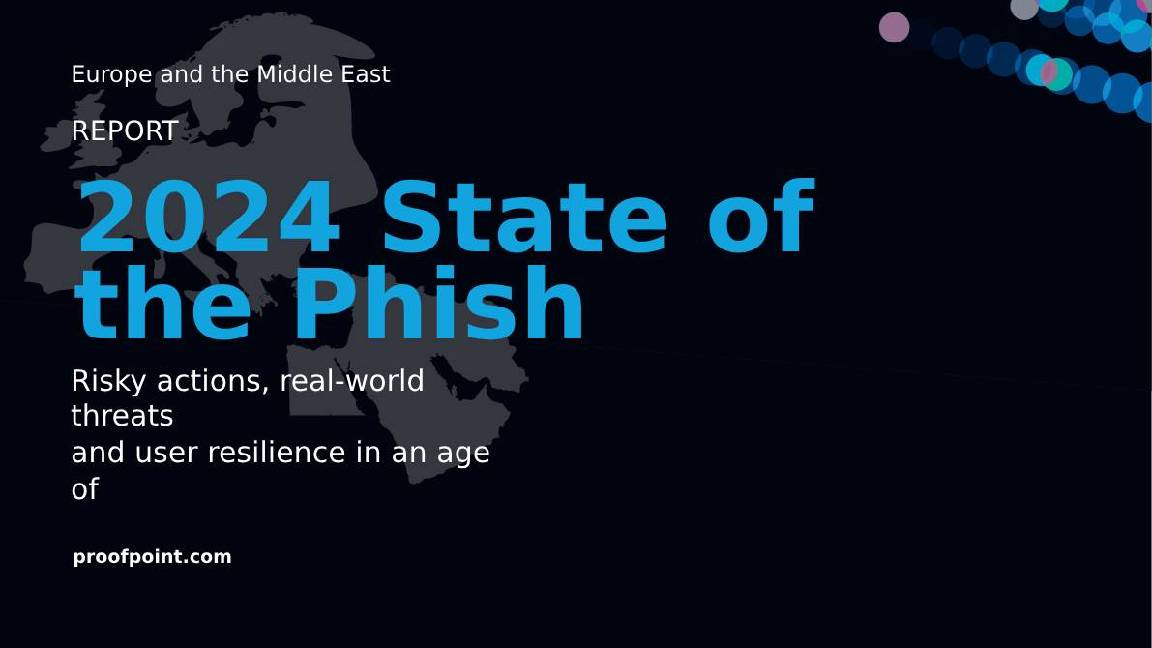2024 State of the phish report
Risky actions, real-world threats and user resilience in an age of human-centric cybersecurity


Cybercriminals don’t even have to try hard to hack into an organization. According to this year’s State of the Phish survey, 71% of working adults admitted to taking a risky action, such as reusing or sharing a password.
This report shares insights from a survey that studied the behaviors of 7,500 end users and 1,050 security professionals across 15 countries. Insights were derived from 183 million simulated phishing messages sent by customers over 12 months.
Here’s what you’ll learn:
- Gaps in security awareness training programs.
- The threat landscape in Europe and the Middle East.
- Recommendations that alleviate risks.
Download now
Provided by Proofpoint
Get the ITPro daily newsletter
Sign up today and you will receive a free copy of our Future Focus 2025 report - the leading guidance on AI, cybersecurity and other IT challenges as per 700+ senior executives
ITPro is a global business technology website providing the latest news, analysis, and business insight for IT decision-makers. Whether it's cyber security, cloud computing, IT infrastructure, or business strategy, we aim to equip leaders with the data they need to make informed IT investments.
For regular updates delivered to your inbox and social feeds, be sure to sign up to our daily newsletter and follow on us LinkedIn and Twitter.
-
 Cleo attack victim list grows as Hertz confirms customer data stolen
Cleo attack victim list grows as Hertz confirms customer data stolenNews Hertz has confirmed it suffered a data breach as a result of the Cleo zero-day vulnerability in late 2024, with the car rental giant warning that customer data was stolen.
By Ross Kelly
-
 Lateral moves in tech: Why leaders should support employee mobility
Lateral moves in tech: Why leaders should support employee mobilityIn-depth Encouraging staff to switch roles can have long-term benefits for skills in the tech sector
By Keri Allan
-
 Cleo attack victim list grows as Hertz confirms customer data stolen – and security experts say it won't be the last
Cleo attack victim list grows as Hertz confirms customer data stolen – and security experts say it won't be the lastNews Hertz has confirmed it suffered a data breach as a result of the Cleo zero-day vulnerability in late 2024, with the car rental giant warning that customer data was stolen.
By Ross Kelly
-
 ‘Phishing kits are a force multiplier': Cheap cyber crime kits can be bought on the dark web for less than $25 – and experts warn it’s lowering the barrier of entry for amateur hackers
‘Phishing kits are a force multiplier': Cheap cyber crime kits can be bought on the dark web for less than $25 – and experts warn it’s lowering the barrier of entry for amateur hackersNews Research from NordVPN shows phishing kits are now widely available on the dark web and via messaging apps like Telegram, and are often selling for less than $25.
By Emma Woollacott
-
 Cyber attacks against UK firms dropped by 10% last year, but experts say don't get complacent
Cyber attacks against UK firms dropped by 10% last year, but experts say don't get complacentNews More than four-in-ten UK businesses were hit by a cyber attack last year, marking a decrease on the year prior – but security experts have warned enterprises to still remain vigilant.
By Emma Woollacott
-
 ‘Insiders don’t need to break in’: A developer crippled company networks with malicious code and a ‘kill switch’ after being sacked – and experts warn it shows the huge danger of insider threats
‘Insiders don’t need to break in’: A developer crippled company networks with malicious code and a ‘kill switch’ after being sacked – and experts warn it shows the huge danger of insider threatsNews Security experts have warned ITPro over the risks of insider threats from disgruntled workers after a software developer deployed a 'kill switch' to sabotage his former employer’s networks.
By Ross Kelly
-
 Healthcare systems are rife with exploits — and ransomware gangs have noticed
Healthcare systems are rife with exploits — and ransomware gangs have noticedNews Nearly nine-in-ten healthcare organizations have medical devices that are vulnerable to exploits, and ransomware groups are taking notice.
By Nicole Kobie
-
 Have I Been Pwned owner Troy Hunt’s mailing list compromised in phishing attack
Have I Been Pwned owner Troy Hunt’s mailing list compromised in phishing attackTroy Hunt, the security blogger behind data-breach site Have I Been Pwned, has fallen victim to a phishing attack targeting his email subscriber list.
By Jane McCallion
-
 Security experts warn of ‘contradictory confidence’ over critical infrastructure threats
Security experts warn of ‘contradictory confidence’ over critical infrastructure threatsNews Almost all critical national infrastructure (CNI) organizations in the UK (95%) experienced a data breach in the last year, according to new research.
By Emma Woollacott
-
 Healthcare organizations need to shake up email security practices
Healthcare organizations need to shake up email security practicesNews Microsoft 365 is the source of almost half of all healthcare email breaches, thanks mainly to misconfigurations in security settings.
By Emma Woollacott